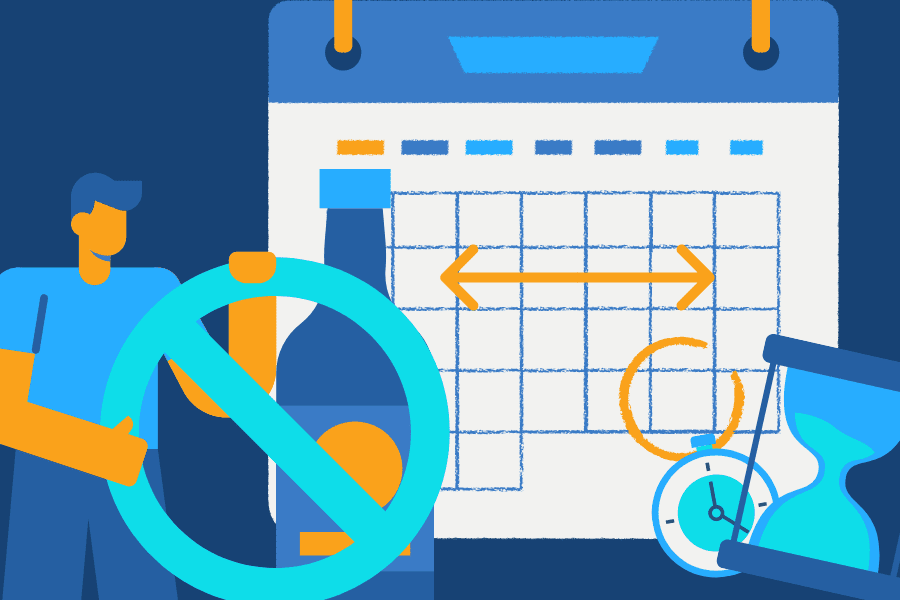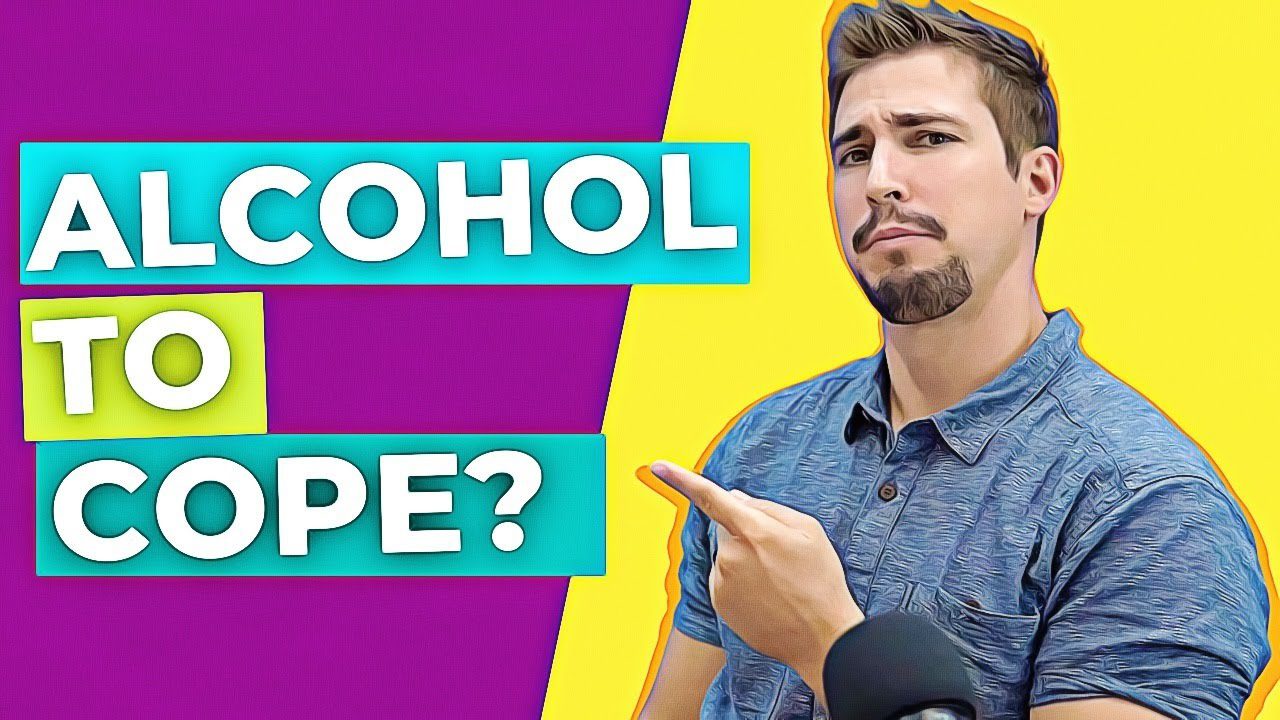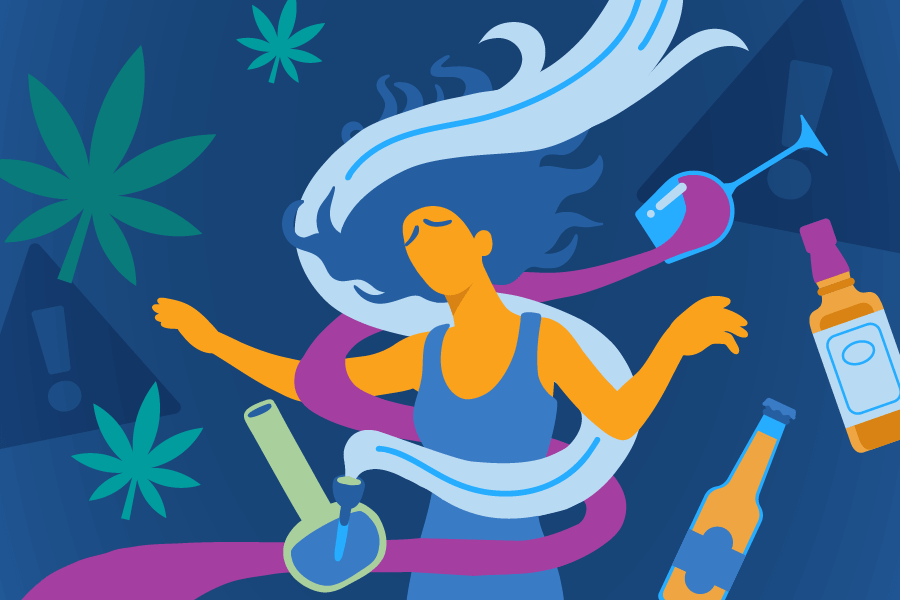Alcohol Withdrawal Timeline
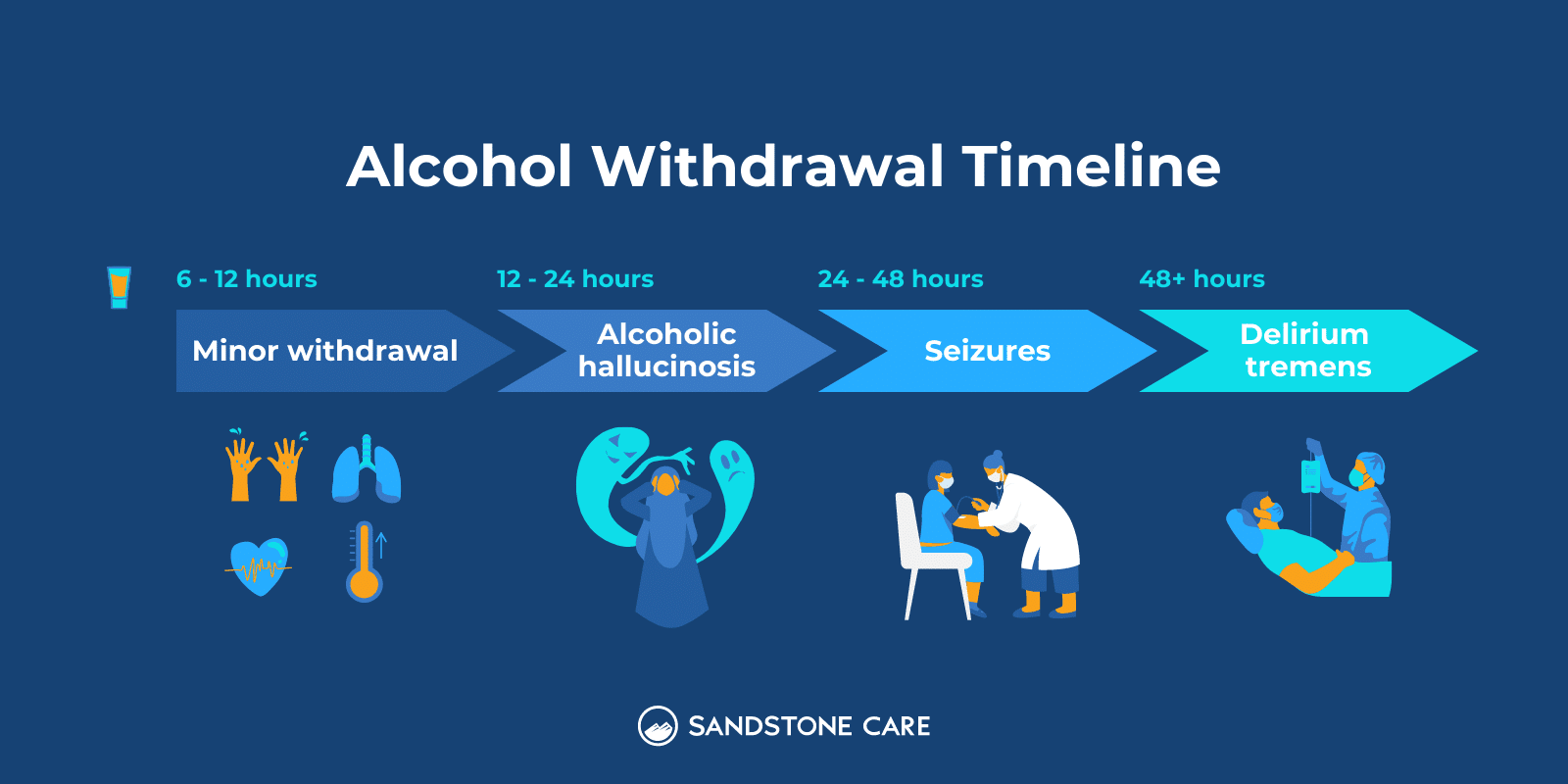
What Is The Timeline For Alcohol Withdrawal?
Symptoms of alcohol withdrawal may occur as early as a few hours after a person has had their last drink.
These symptoms may reach their peak within 24 to 48 hours after alcohol use has stopped for some individuals but can continue on longer for others.
The alcohol withdrawal timeline may occur in stages that include:
- Minor withdrawal symptoms
Minor withdrawal symptoms can happen around 6 to 12 hours after a person has had their last drink. These moderate symptoms may include excessive sweating, nausea and vomiting, elevated heart rate and body temperature, and rapid breathing. - Alcoholic hallucinosis
A person may experience hallucinations after 12 to 24 hours. They may see or hear things (auditory hallucinations) that aren’t there. - Alcohol withdrawal seizures
Around 24 to 48 hours after the last drink, a person may experience seizures and other mild symptoms. If you or a loved one are experiencing seizures, it is important to seek medical help immediately. - Delirium tremens
Delirium tremens is a severe symptom, and if someone is in this stage, it is imperative that they receive immediate medical attention. These severe withdrawal symptoms can lead to cardiac collapse and become life-threatening.
Why Does The Body Have Withdrawal?
When a person repeatedly uses a substance over time, it causes imbalances in both the brain and body.
Withdrawal is the body’s response to the sudden change and absence of the substance.
When a person experiences withdrawal symptoms, their body is trying to get back into balance.
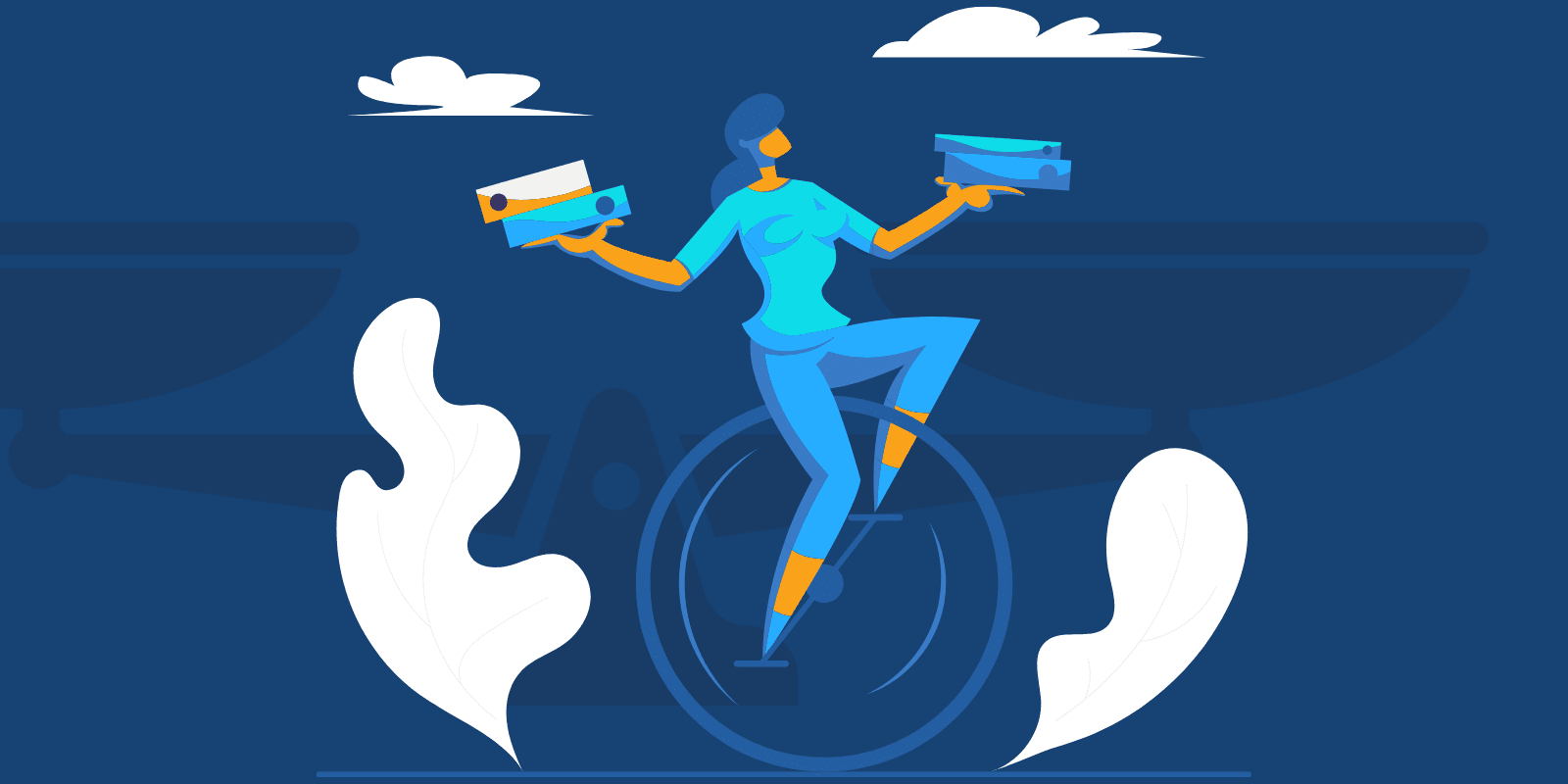
What Is One Of The First Signs Of Withdrawal?
Some of the most common, early first signs of withdrawal include:
- Sweating
- Agitation
- Anxiety
- Muscle aches
- Runny nose
What Happens As Soon As You Stop Drinking?
The first day a person stops drinking may feel uncomfortable or unpleasant.
As soon as a person stops drinking, the body starts to adjust to these changes.
Because of this, they can experience withdrawal symptoms within a few hours of stopping drinking.

How Long Does It Take For Body To Return To Normal After Alcohol?
There is no set amount of time it takes for the body to return to normal after prolonged alcohol use.
This can also rely on a variety of different factors. For some, it can be days, others weeks, and maybe months if a person has experienced significant damage caused by alcohol use.
Symptoms Of Alcohol Withdrawal
What Are The Symptoms Of Withdrawal?
Experiencing withdrawal from alcohol or any other substance can be different from person to person.
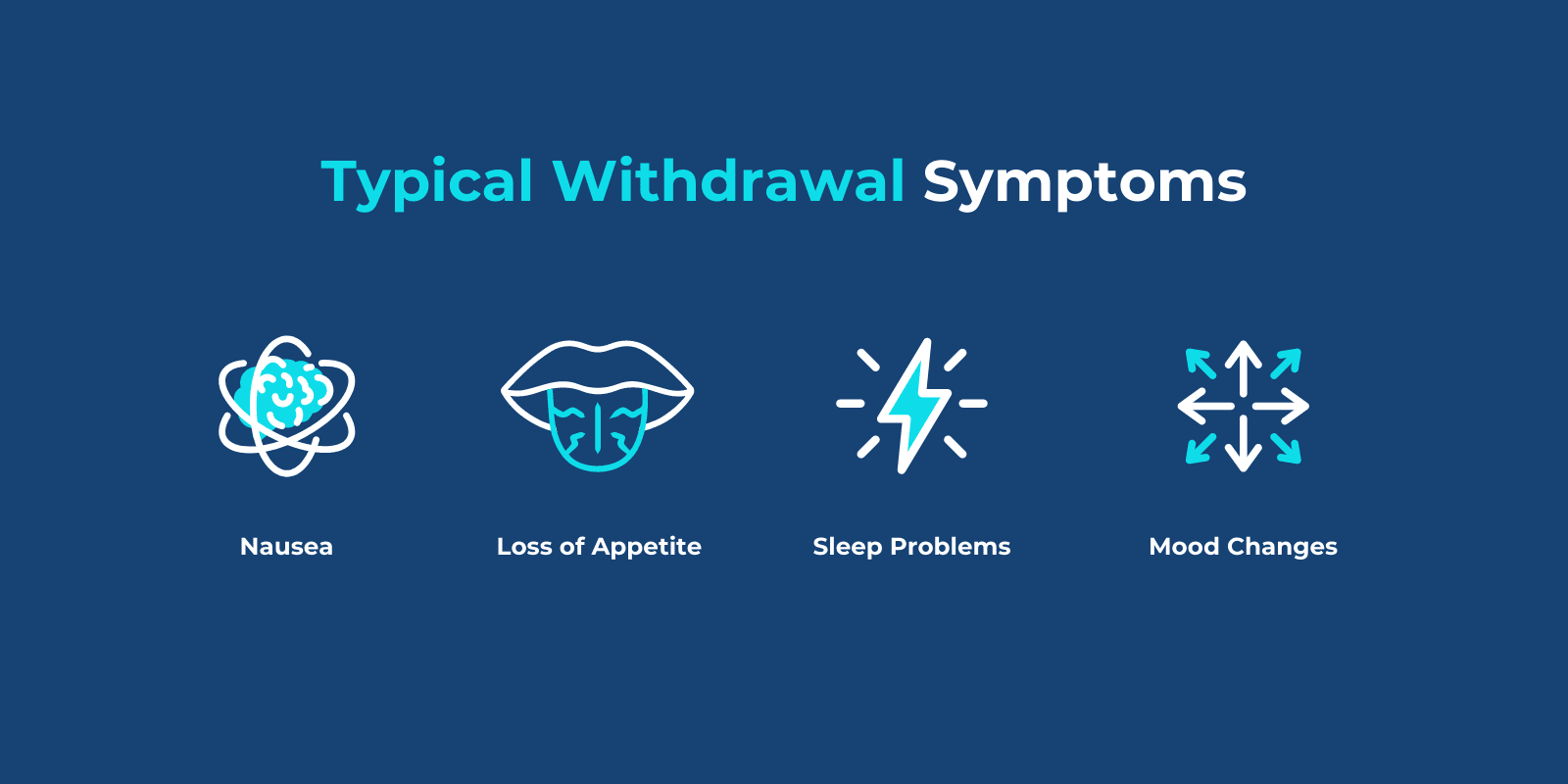
Generally, common symptoms of withdrawal can include the following:
- Anxiety
- Muscle aches and pains
- Nausea and vomiting
- Sweating
- Loss of appetite
- Fatigue
- Irritability or agitation
- Tremors
- Confusion
- Paranoia
What Are The Physical Symptoms Of Alcohol Withdrawal?
Physical symptoms of alcohol withdrawal can include:
- Tremors
- Sweating
- Loss of appetite
- Nausea or vomiting
- Rapid heartbeat
- Restlessness
- Sleep problems
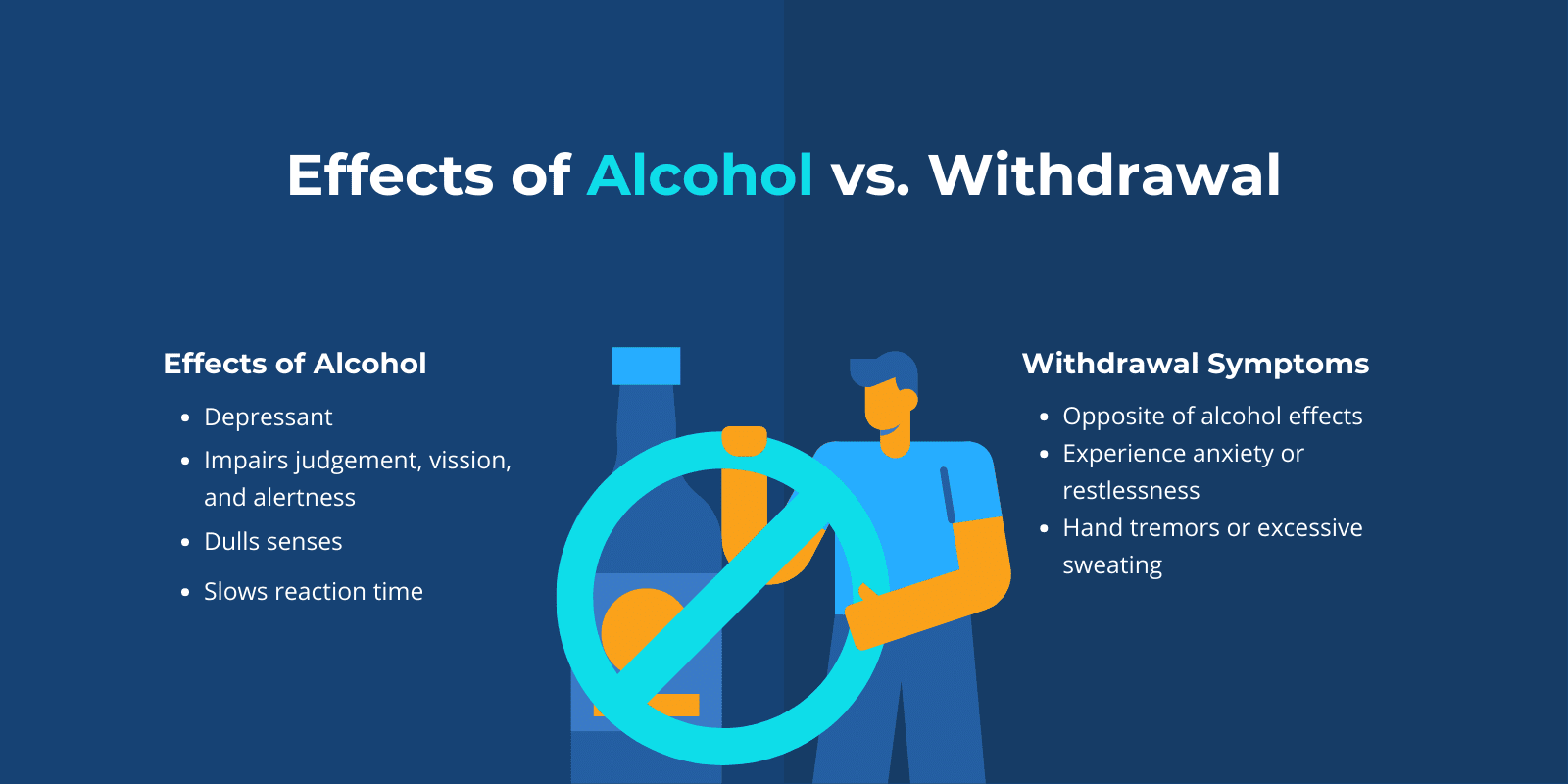
What Happens To Your Emotions When You Stop Drinking?
When a person stops drinking, they may experience increased symptoms of increased anxiety, agitation, and irritability.
All the changes happening in the brain and body can affect a person’s mood and mental well-being.
When a person stops drinking, it can feel very hard, and the emotions that come along may make a person feel like they want to drink again.
It is important to remember that stopping drinking is the best choice for the long run, even if it seems that it would make you feel better temporarily.
How Long Does Anxiety Last After Drinking?
Some people may experience anxiety a few hours after drinking or even the day following.
Anxiety can be a withdrawal symptom, and symptoms can last anywhere from days to weeks.
Some people may engage in alcohol use as a way to self-medicate for underlying mental health conditions like anxiety. Doing so can worsen a person’s mental health and can require a person to receive treatment for co-occurring disorders if they are present.
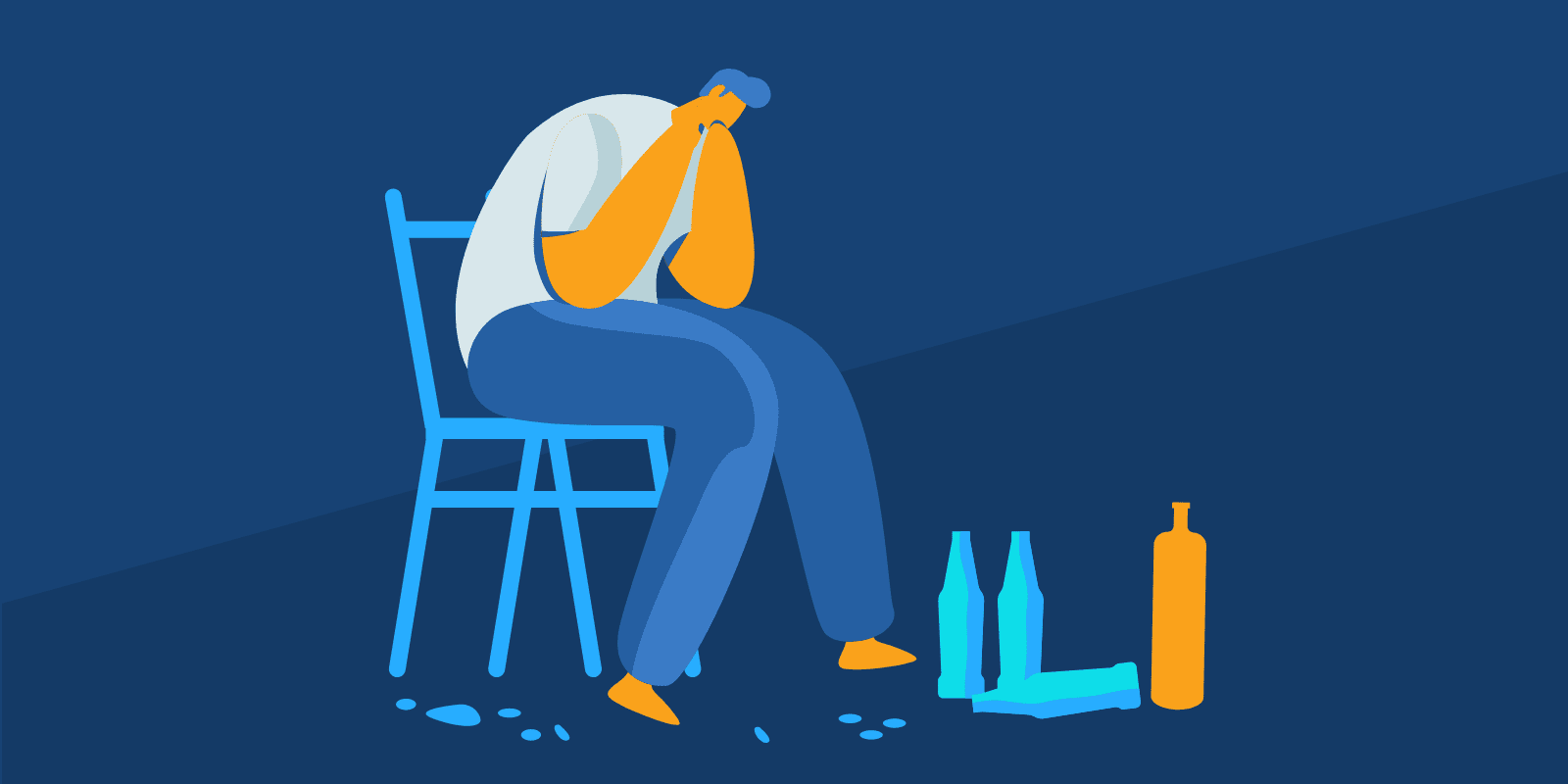
Why Do You Feel So Tired When You Stop Drinking?
The reason you may feel so tired when you stop drinking is that your body may be adjusting to new changes.
How Long Do Withdrawal Side Effects Last?
Withdrawal symptoms can last anywhere from days to weeks, depending on a variety of different factors.
Alcohol Withdrawal Syndrome
What Is Alcohol Withdrawal Syndrome?
Alcohol withdrawal syndrome refers to symptoms that are experienced when a person who has engaged in heavy drinking suddenly decreases or stops alcohol use.
Many people don’t recognize the serious impact alcohol can have on a person’s physical and mental health because it is so commonly used, especially among teens and young adults.
It is important to understand the dangers of alcohol use as well as the signs of alcohol withdrawal to determine if a person needs to seek help or receive medical attention.
Quitting alcohol can feel very difficult at first, as the urge to drink is still present. However, doing so is the best decision in the long run for your health and overall well-being.
What Are The Stages Of The Alcohol Addiction Cycle?
According to the National Institute on Alcohol Abuse and Alcoholism, addiction can follow a cycle with three stages.
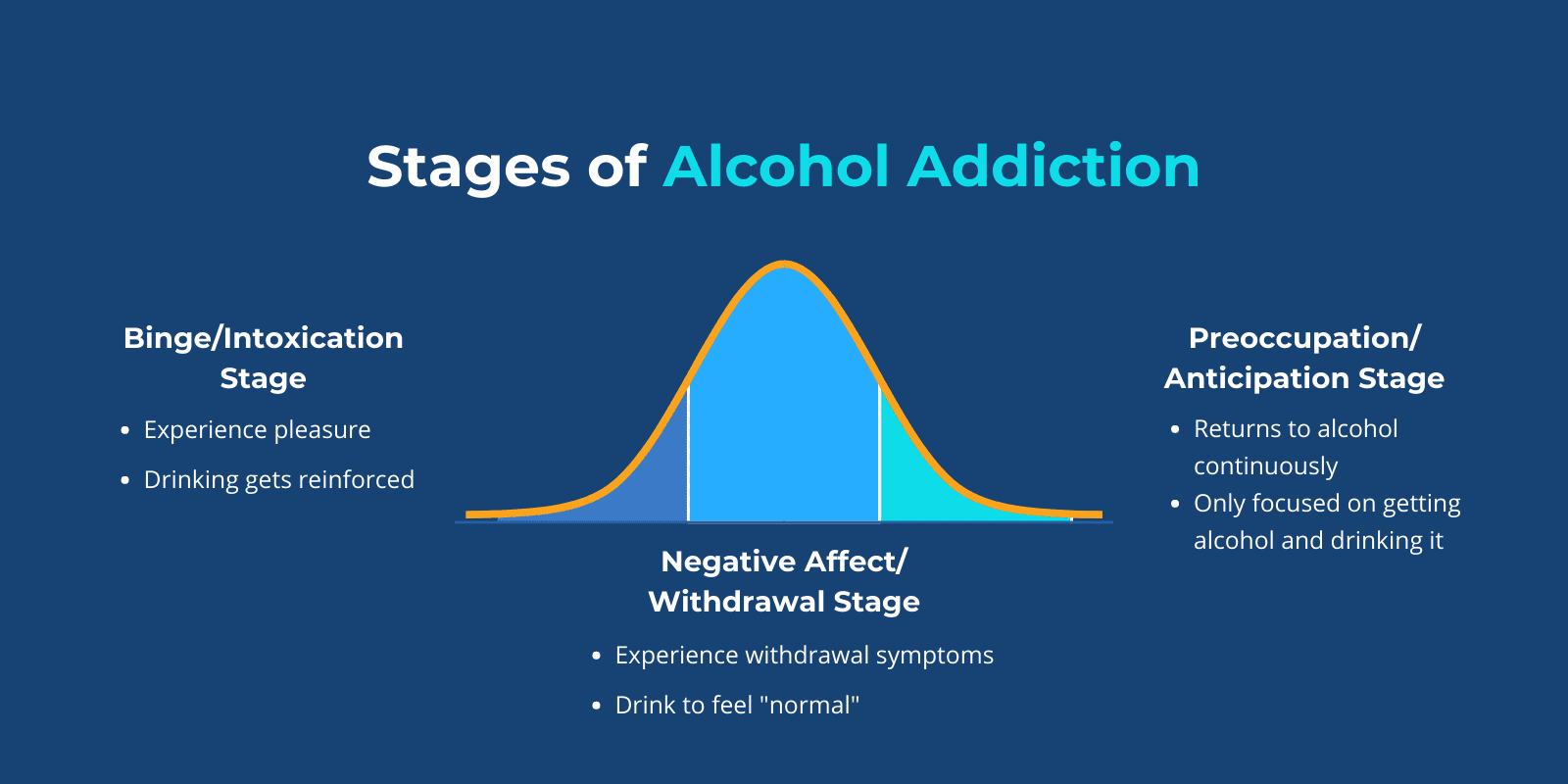
These stages include:
- Binge/Intoxication Stage
In this stage, a person experiences the rewarding effects and pleasure from alcohol, such as euphoria or temporary anxiety reduction. Drinking behaviors begin to become reinforced by the basal ganglia, an important region of the brain. This leads to habit-forming and a change in the way an individual responds to stimuli related to alcohol use. - Negative Affect/ Withdrawal Stage
During this stage, a person will experience symptoms when they stop or decrease heavy drinking. At this point, it is hard to feel pleasure, and a person no longer drinks to feel “euphoric” or rewarded but to feel somewhat “normal” again and to get relief from discomfort and low feelings that the alcohol has caused. - Preoccupation/Anticipation Stage
In this stage, a person returns to alcohol use after a period of abstinence or trying to quit. They become preoccupied with getting alcohol and consuming it.
What Is The Process Of Withdrawal
When a person engages in substance use, it causes changes in the brain and body, causing the brain to adjust.
With continued use, a person may develop a tolerance, meaning they need more and more of the substance to achieve the same effects.
A tolerance may then develop into a dependence, where a person uses a substance just to feel “normal” again.
When someone has a dependency, they will experience withdrawal symptoms if they try to stop engaging in substance use or abruptly decrease their use.
Withdrawal is a response from the body to the absence or sudden decrease of a substance.
During the process of withdrawal, the body is trying to regulate and return to its normal state, resulting in what can be very uncomfortable mental and physical effects.
What Can I Expect After Stopping Drinking?
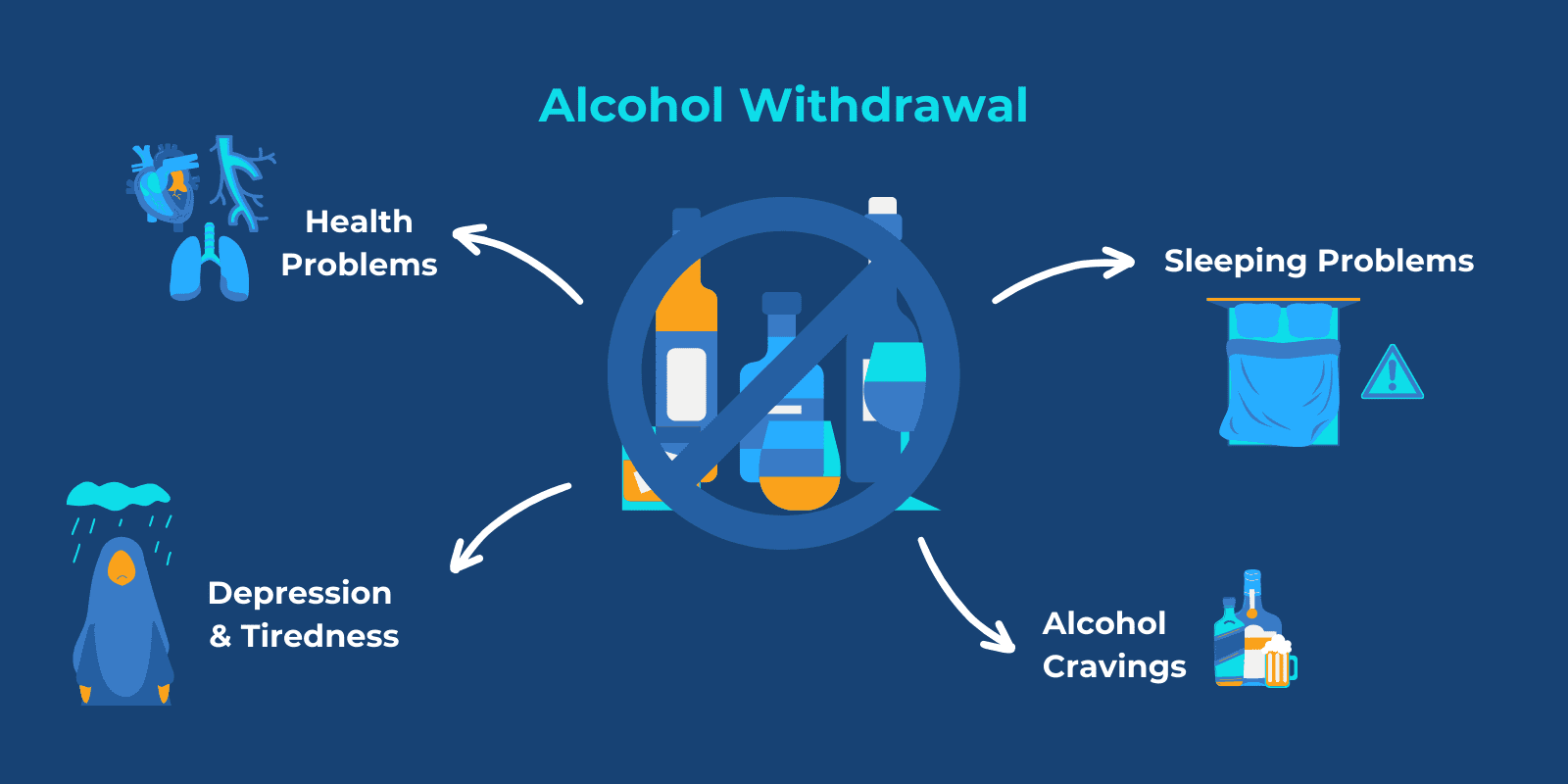
If you have drunk heavily for a significant period of time, stopping drinking may not be very easy at first. However, it is necessary for your health and well-being.
After stopping drinking, you may experience withdrawal symptoms that may last a few days or a few weeks in severe cases.
You may feel changes in both your body and your mind. Many people report feeling low, depressed, tired, and having problems sleeping.
Stopping drinking can feel very uncomfortable at first, and many people may have cravings or feel the urge to drink again as a way to cope with withdrawal symptoms. However, this will only worsen the situation, even if it seems like an opportunity for temporary relief.
If you are planning on stopping drinking, it is helpful to consult with your healthcare provider or a medical professional who can offer you guidance and medical advice.
How Long Does It Take Before Withdrawal?
Withdrawal symptoms can occur within a day or two of stopping drinking.
In more severe cases, withdrawal symptoms may begin within hours of discontinued alcohol use.
The alcohol withdrawal timeline can depend on a variety of different factors that include:
- How frequently a person drinks
- The amount of alcohol they drink
- How long have they been drinking
- Medical history
- Other health conditions
- Presence of other substance use disorders
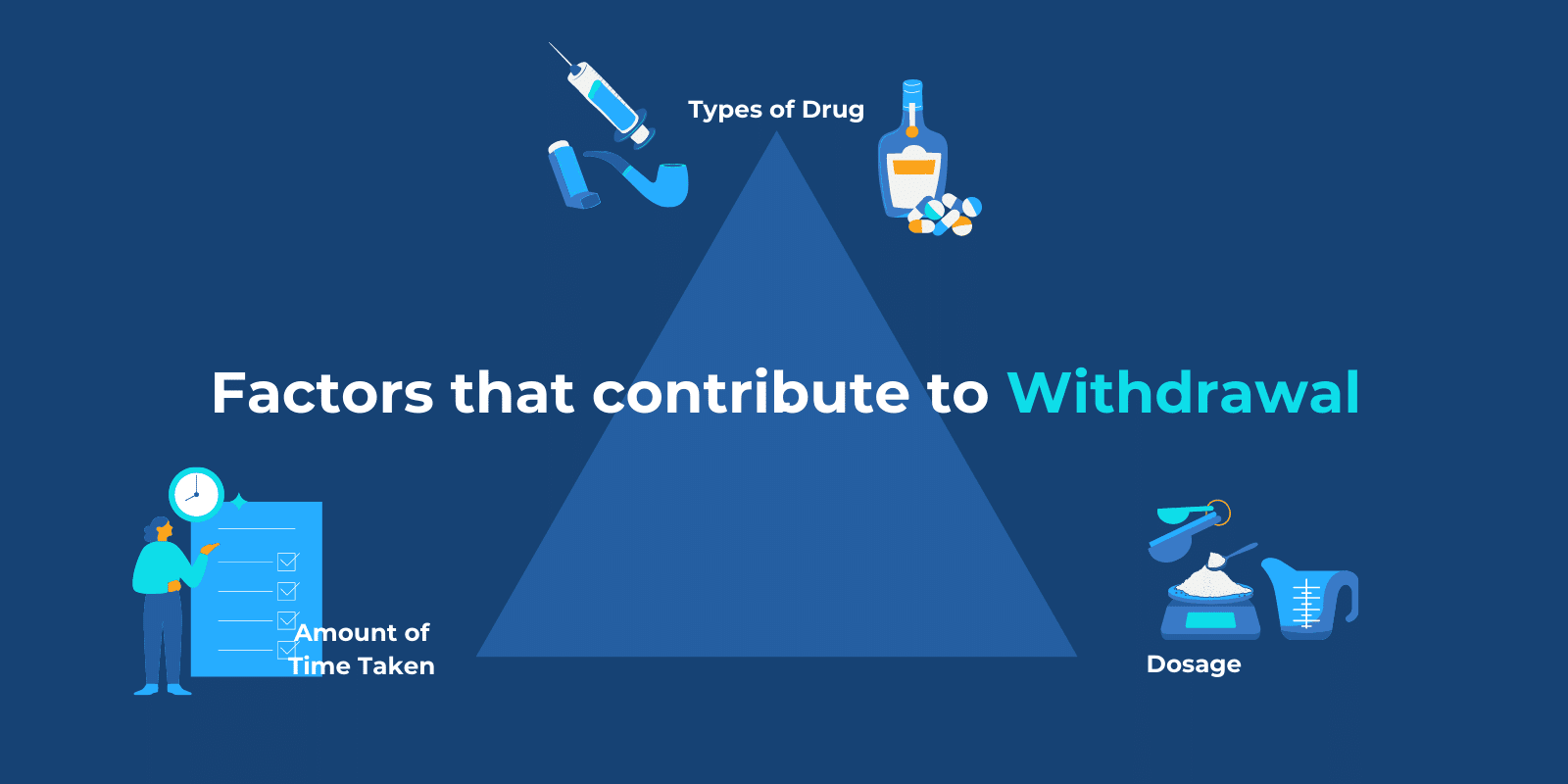
How Does Your Body Heal When You Quit Drinking?
The effects of alcohol can negatively impact both the brain and the body.
However, when a person quits drinking, the body can begin to heal itself.
The damage that comes from alcohol can impact important systems like the brain, liver, and cardiovascular symptoms. When a person stops drinking, these systems can slowly begin to heal themselves.
A person may see improvements in their skin, sleep, weight, mental health, immune system, and thinking.
How Long Does It Take For Brain Chemistry To Return To Normal After Alcohol?
Research suggests that it takes around two weeks for the brain to start returning to normal after quitting alcohol.
The recovery journey, however, is unique to each person, so individuals may see improvements in their brain and body health at different points in the process.
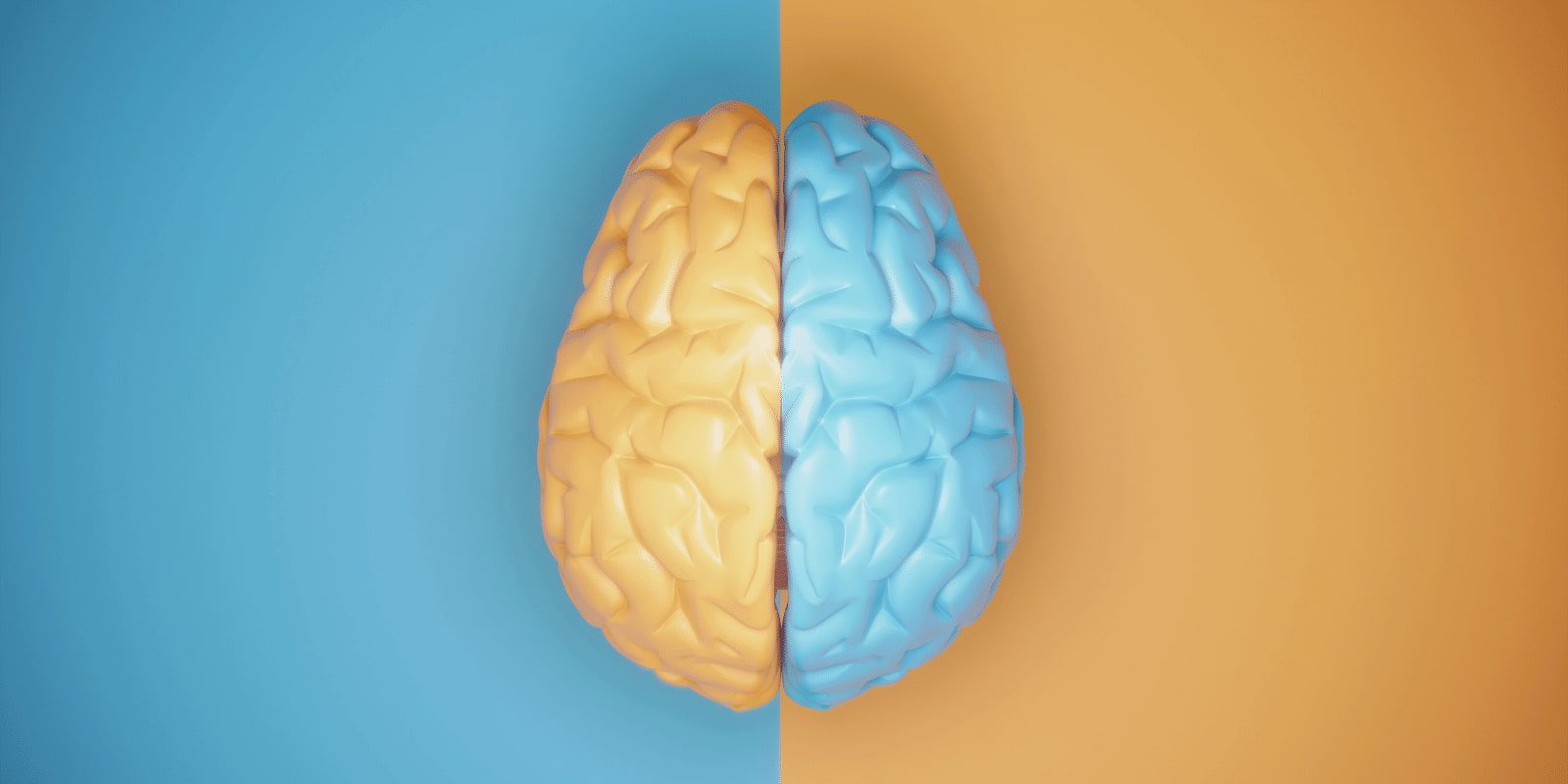
Alcohol Use Disorder And Your Liver
How Many Drinks A Week Will Damage Your Liver?
The impact of alcohol on a person’s liver can be different based on the individual.
A person’s chances of experiencing liver damage go up the longer you have been drinking and the more alcohol you drink.
According to the American Journal of Gastroenterology, in women, drinking more than five drinks per day was associated with an increased risk of liver cirrhosis.
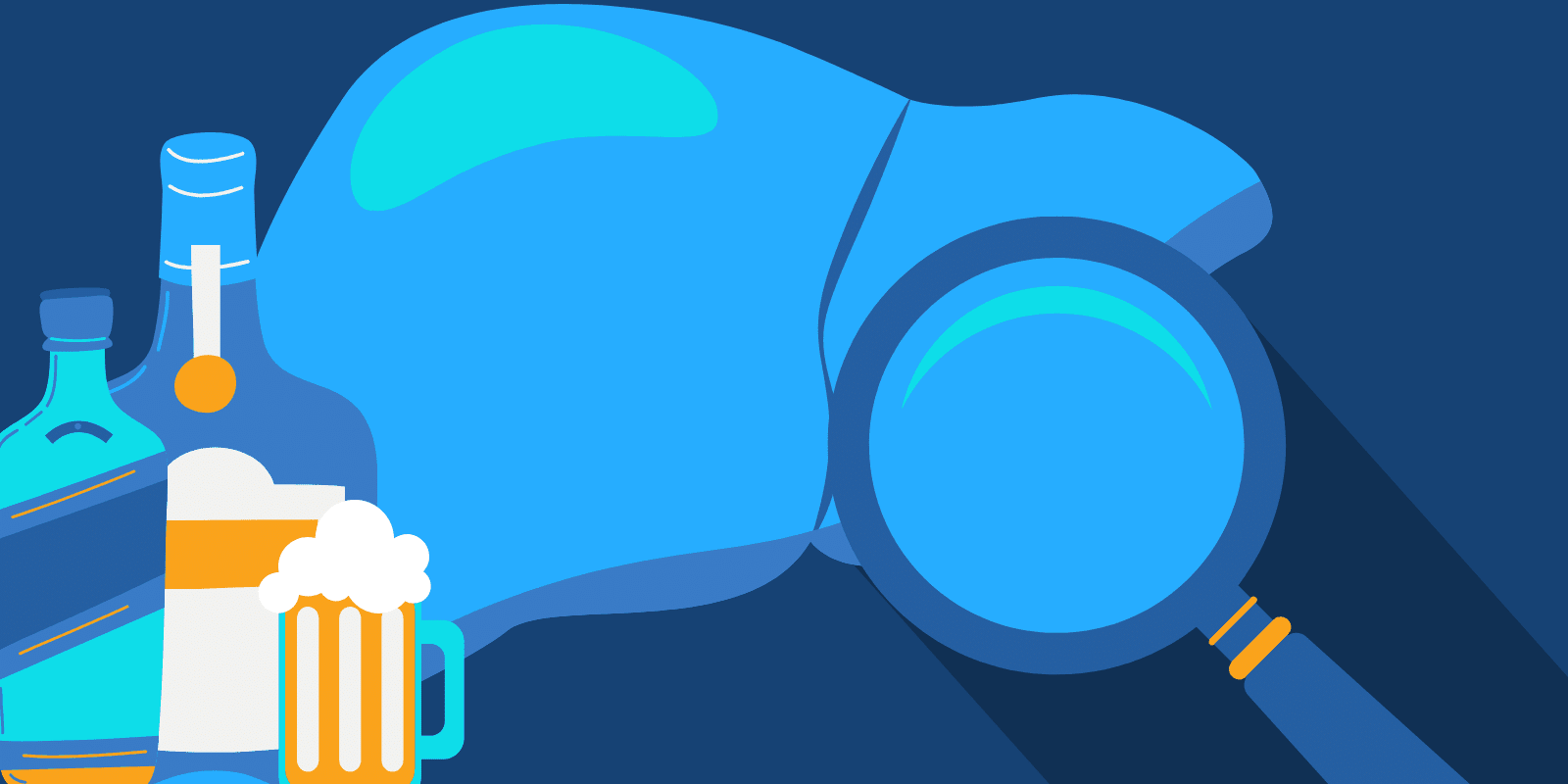
What Are The First Signs Of Liver Damage From Alcohol?
Some of the first signs of liver damage from alcohol can include:
- Jaundice: yellowing of the skin and eyes
- Nausea or vomiting
- Swelling in the legs and ankles
- Weight loss
- Confusion of drowsiness
How Long Does It Take For Alcohol To Get Out Of Your Liver?
Typically, the liver can process about an ounce of alcohol every hour.
The time it takes for the liver to process alcohol can also depend on a variety of factors, such as age, body size, or the time since a person’s last drink.
Many experts suggest avoiding drinking alcohol for around 30 days the help the liver get back to its normal function.
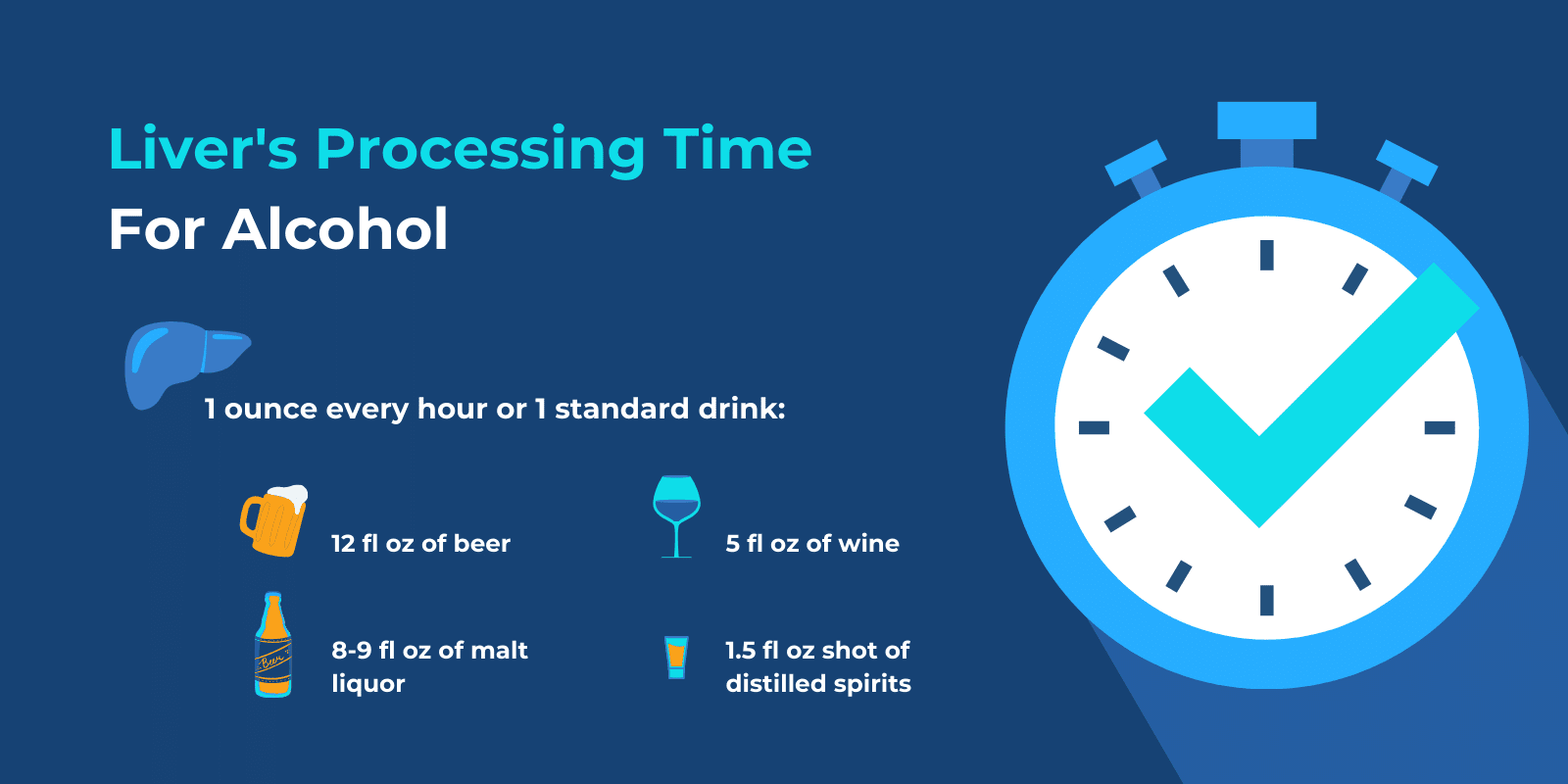
How Do I Know If My Liver Is Ok?
If you have concerns about your liver, seek help from your healthcare provider to do blood tests to assess the liver.
How Do You Know When Your Liver Is Healed?
Signs your liver is healing from alcohol use can include:
- Healthier-looking eyes and skin
- Reduced swelling
- Decreased stomach pain
- Increased energy
- Stable weight
- Return of appetite
- Better bloodwork results
How Much Alcohol Is Too Much
What Are Signs That You Are Drinking Too Much Alcohol?
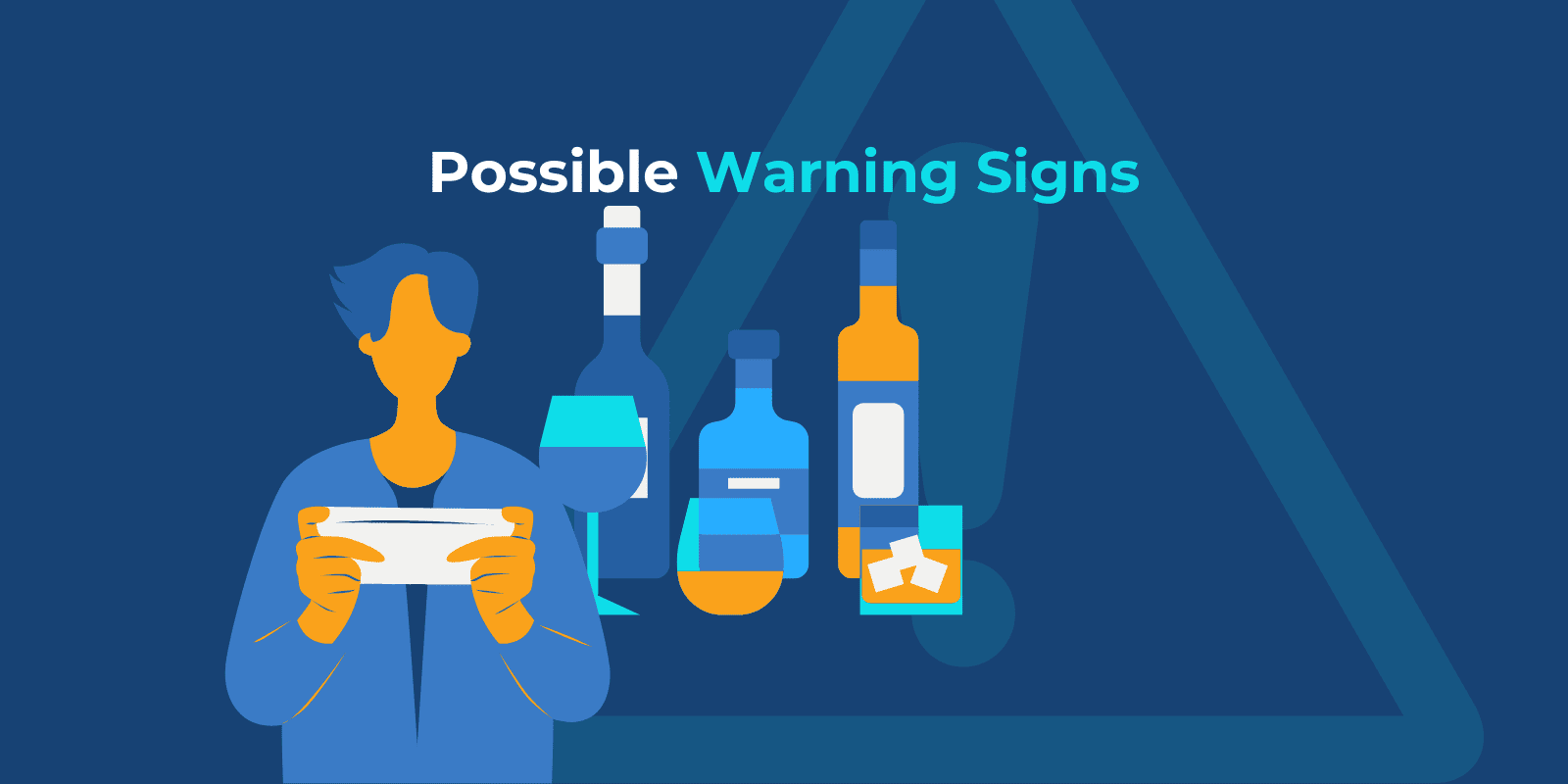
For many people, it may be hard to realize that they have a drinking problem.
Especially because alcohol use is socially accepted, many people don’t see the harm in having a couple of drinks. They often don’t understand the severity of the effects alcohol use can have on a person’s life, health, and well-being.
Signs that a person may be drinking too much alcohol can include:
- Loved ones have expressed their concerns on multiple occasions about your drinking
- Using alcohol as a way to self-medicate or cope with difficult feelings and situations
- Lying or keeping secrets about drinking
- Drinking has begun to affect your life at home, at work, and in relationships
- You’ve tried to stop drinking but couldn’t
- Engaging in heavy drinking alone
- You are often in situations that involve alcohol
What Is Considered A Heavy Drinker?
The NIAAA defines heavy alcohol use as:
- Drinking more than four drinks on any day or more than 14 drinks a week for men
- Drinking more than three drinks on any day or more than seven drinks per week for women
Additionally, SAMHSA refers to heavy drinking as binge drinking or more than five or more days in a month.
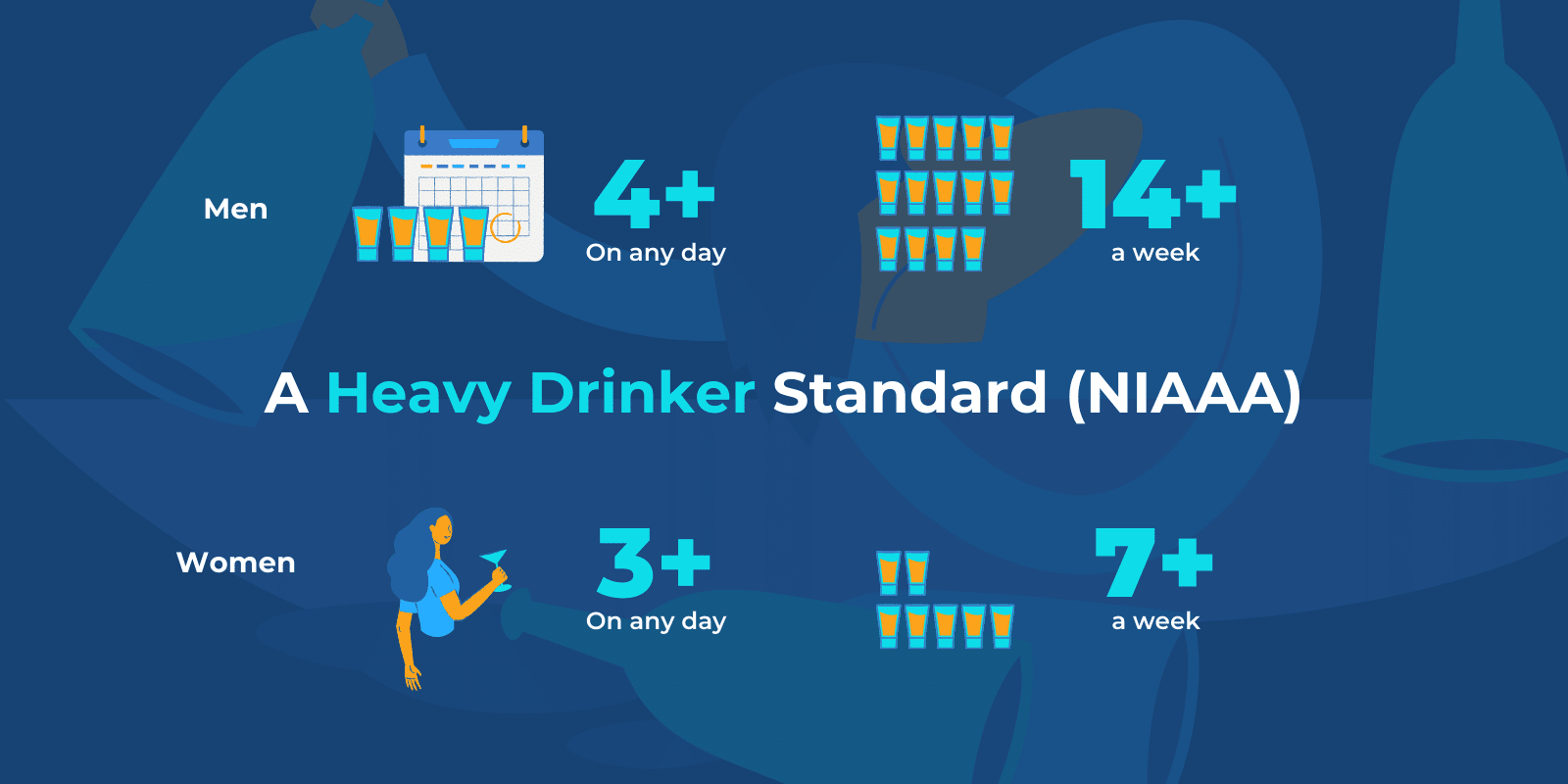
Is A Bottle Of Wine A Day Too Much?
According to the CDC, a standard drink of wine is 5 ounces.
Binge drinking, in this case, would be consuming four or more 5-ounce glasses of wine on a single occasion for women and five or more glasses for men.
Drinking over this amount can lead to numerous negative effects on an individual’s health.
Is A 6 Pack A Night Too Much?
Drinking a six pack a night is quite a large amount.
Consuming a six-pack a night can result in a significant impact on a person’s health and put a person at risk of facing severe negative effects of alcohol use.
What Happens When You Drink Alcohol Every Day?
Excessive alcohol use can increase a person’s risk of experiencing numerous harmful health conditions.
Excessive drinking can also lead to the development of chronic diseases and other problems such as high blood pressure, heart disease, cancer, weakened immune systems, learning problems, mental health problems, and alcohol use disorders.
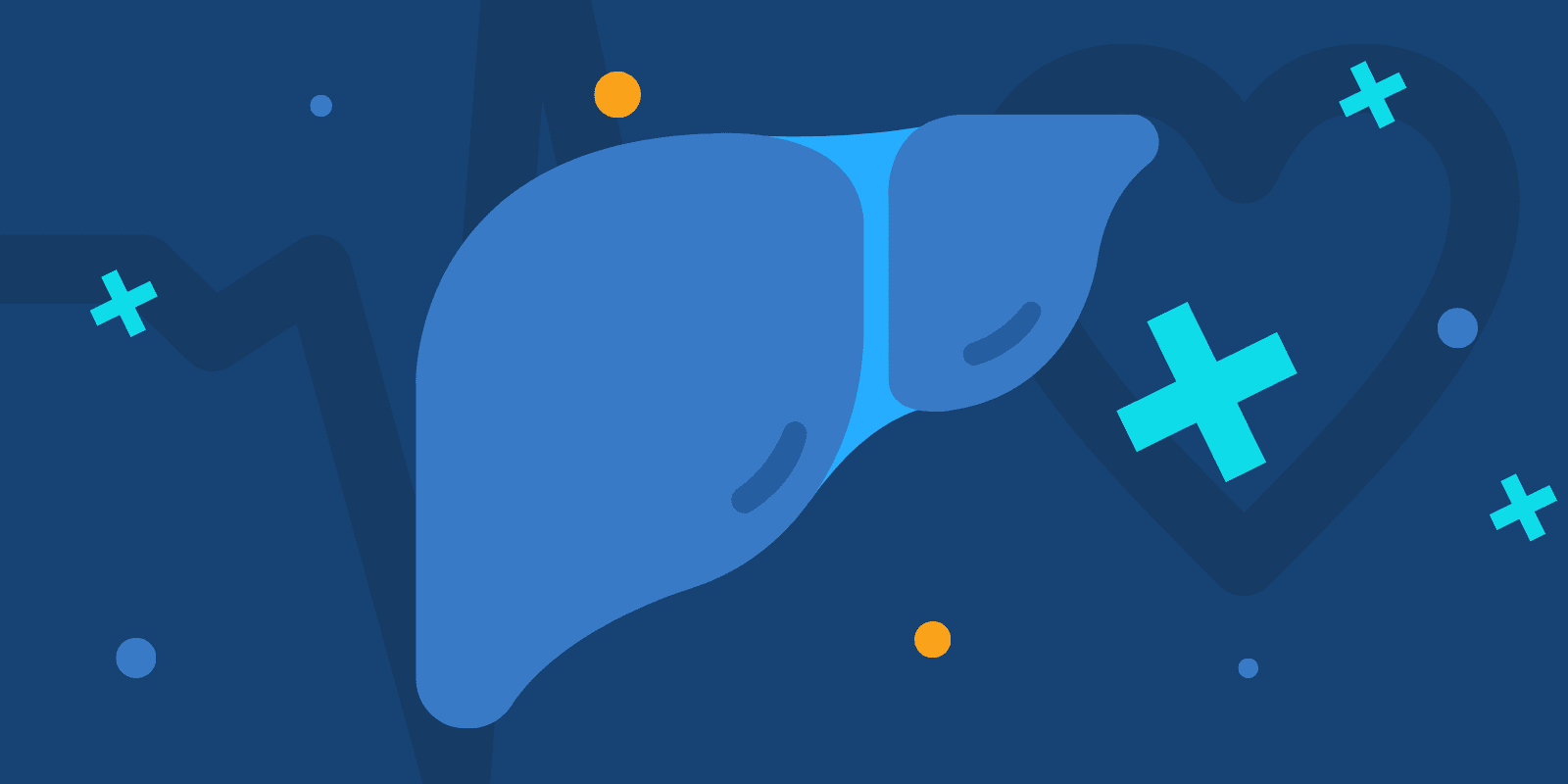
FAQ
You have questions. We have answers.
Our goal is to provide the most helpful information. Please reach out to us if you have any additional questions. We are here to help in any way we can.
Naltrexone is a medication approved by the FDA for treating alcohol use disorder and opioid use disorder.
It works by blocking the effects and feelings of alcohol and can help reduce alcohol cravings.
However, it is important to discuss with your healthcare provider which medications are safe as it is not a recommended MAT option for individuals under 18 years old or who have other health conditions.
Additionally, according to the Journal of Clinical & Diagnostic Research, benzodiazepines may be used as a part of treatment for alcohol withdrawal.
The four stages of addiction include:
- Experimentation
- Regular use/ abuse
- Risky use
- Dependence and Addiction
Alcohol use can have a significant impact on a person’s liver health, along with many other important body systems.
Common signs that may indicate your liver is struggling can include the following:
- Skin and eyes that appear yellow (jaundice)
- Fluid retention
- Swelling in the legs and ankles
- Nausea or vomiting
Four common withdrawal symptoms can include:
- Sweating
- Anxiety
- Nausea and vomiting
- Loss of appetite
It is important to find a treatment center that fits your needs the best.
Each treatment plan is unique, not a one-size-fits-all situation.
A treatment plan for alcohol addiction may include components such as:
- Behavioral treatment: counseling can help identify unhealthy thoughts and feelings and how they contribute to destructive behaviors
- Medication: Medication-assisted detox is typically given to those who enter treatment with alcohol dependence. Medication-assisted treatment (MAT) is a long-term form of treatment that couples medication with other therapy approaches.
- Support groups: Alcoholics Anonymous (AA) and other 12-step programs can be helpful for those struggling with alcoholism by providing support and guidance from peers and others who can relate.
A person who is struggling with severe alcohol use and addiction may find inpatient treatment beneficial. Others who may have mild to moderate symptoms but are still in need of support may benefit from an intensive outpatient program (IOP) or day treatment program.
Seeking help for alcohol abuse and addiction is one of the first steps in healing.
SAMHSA has a behavioral health treatment services locator that serves as an anonymous source of information for those seeking mental health or substance use and treatment.


Let’s take the next steps together
Alcohol withdrawal can be a difficult part of the alcohol addiction recovery journey. Although uncomfortable, stopping drinking will benefit in the long-run. Sandstone Care is here to support teens and young adults with mental health and substance use disorders.

